

My monthly report covers a large part of what I have been doing in the free software world. I write it for
my donators (thanks to them!) but also for the wider Debian community because it can give ideas to newcomers and it s one of the best ways to find volunteers to work with me on projects that matter to me.
Debian LTS
This month I have been paid to work 21.25 hours on Debian LTS. During this time I worked on the following things:
- Sent a first patch and later an updated patch to modify DAK so that it can send the accept/reject mails to the signer of the upload instead of the maintainer. Details in #796784.
- Uploaded MySQL 5.5 compabitility fixes for phpmyadmin and postfix-policyd so that we could release MySQL 5.5 as an upgrade option MySQL 5.1 (see DLA 359-1).
- Released DLA 361-1 on bouncycastle after having gotten the green light from upstream.
- Released DLA 362-1 on dhcpd fixing three CVE.
- Released DLA 366-1 on arts fixing one CVE.
- Released DLA 367-1 on kdelibs fixing one CVE.
- Handled the LTS frontdesk for a whole week.
- Sponsored the upload of foomatic-filters for DLA 371-1.
- Filed #808256 and #808257 to get libnsbmp/libnsgif removed. Both packages had recent CVE and were sitting unused in Debian since their introduction 6 years ago
- Released DLA 372-1 announcing the end of support of virtualbox-ose.
- Updated git repository of debian-security-support to account for the former change and also took care of a few pending issues.
- Released DLA 376-1 on mono to fix one CVE.
- Added some initial DEP-8 tests to python-django that will help to ensure that a security update doesn t break the package.
Distro Tracker
I put a big focus on tracker.debian.org work this month. I completed the switch of the mail interface from packages.qa.debian.org to tracker.debian.org and I
announced the change on debian-devel-announce.
The changes resulted in a few problems that I quickly fixed (like
#807073) and some other failures seen only by me and that were generated by weird spam messages (did you know that a subject can t have a newline character but that it can be encoded and folded over multiple lines?).
Related to that I fixed some services so that they send their mails to tracker.debian.org directly instead of relying on the old emails (they get forwarded for now but it would be nice to be able to get rid of that forward). I updated (with the help of Lucas Nussbaum) the service that forwards the Launchpad bugs to the tracker, I sent a patch to update the @packages.debian.org aliases (not yet applied), I updated the configuration of all git commit notice scripts in the Alioth collab-maint and python-modules project (many remain to be done). I asked Ubuntu s Merge-O-Matic to use the new emails as well (see
LP 1525497). DAK and the Debian BTS still have to be updated, as of yet nobody reacted to my announce last but not least I updated many wiki pages which duplicated the instructions to setup the commit notice sent to the PTS.
While on a good track I opted to tackle the long-standing RC bug that was plaguing tracker.debian.org (
#789183), so I updated the codebase to rely on Twitter s bootstrap v4 instead of v2. I had to switch to something else for the icons since glyphicons is no longer provided as part of bootstrap and the actual license for the standalone version was not suitable for use. I opted for
Github s Octicons. I made numerous little improvements while doing that (closing some bugs in the process) and I believe that the result is more pleasant to use.
I also did a lot of bug triage and fixed a few small issues like the incomplete architecture list (
#793547), or fixing a page used only by people with javascript disabled that was not working. Or the invalid links for packages still using CVS (ugh, see
#561228).
Misc packaging
Django. After having added DEP-8 tests (as part of my LTS work, see above), I discovered that the current version in unstable did not pass its test suite so I filed the issue upstream (
ticket 26016) and added the corresponding patch. And I encouraged others to update python-bcrypt in Debian to a newer version that would have worked with Django 1.9 (see
#803096). I also fixed another small issue in Django (see
ticket 26017 with my pull request that got accepted).
I asked the release managers to consider accepting the latest 1.7.x version in jessie (see
#807654) but I have gotten zero answer so far. And I m not the only one waiting an answer. It s a bit of a sad situation we still have a few weeks until the next point release but for once I do it in advance and I would love to have timely feedback.
Last but not least, I started the maintaining the current LTS release (1.8.x) in jessie-backports.
Tryton. I upgraded to Tryton 3.8 and discovered an issue that I filed in
#806781. I sponsored 5 new tryton modules for Matthias Behrle (who is DM) as well as one security upload (for
CVE-2015-0861).
Debian Handbook. I uploaded a new version to Debian Unstable and requested (to the release managers) the permission to upload a backport of it to jessie so that jessie has a version of the package that documents jessie and not wheezy contrary to my other Django request, this one should be non-controversial but I also have had zero answer so far, see
#807515.
Misc. I filed
#808583 when sbuild stopped working with Perl 5.22. I handled
#807860 on publican, I found the corresponding upstream ticket and discovered a work around with the help of upstream (see
here).
Kali related work
I reported a bug to #debian-apt about apt miscalculating download size (ending up with 18 EB!) which resulted in a fix
here in version 1.1.4. Installing a meta-package that needed more than 2GB was no longer possible without this fix and we have a kali-linux-all metapackage in that situation that gets regularly installed in a Jenkins test.
I added captcha support to Distro Tracker and enabled this feature on
pkg.kali.org.
I filed
#808863 against uhd-host because it was not possible to install the package in a systemd-nspawn s managed chroot where /proc is read-only. And we started using this to test dist-upgrade from one version of Kali to the next
Thanks
See you next month for a new summary of my activities.
No comment Liked this article? Click here. My blog is Flattr-enabled.

 Shipping Position Independent Executables and using read-only Global Offset Table was already possible for packages but needed package maintainers to opt-in for each package (see
Shipping Position Independent Executables and using read-only Global Offset Table was already possible for packages but needed package maintainers to opt-in for each package (see 
 My monthly report covers a large part of what I have been doing in the free software world. I write it for
My monthly report covers a large part of what I have been doing in the free software world. I write it for  I'll tune in to the post-based conversation being held on Planet Debian:
I'll tune in to the post-based conversation being held on Planet Debian:  Russell Coker wrote about
Russell Coker wrote about  While the creation of Debian packages is
While the creation of Debian packages is 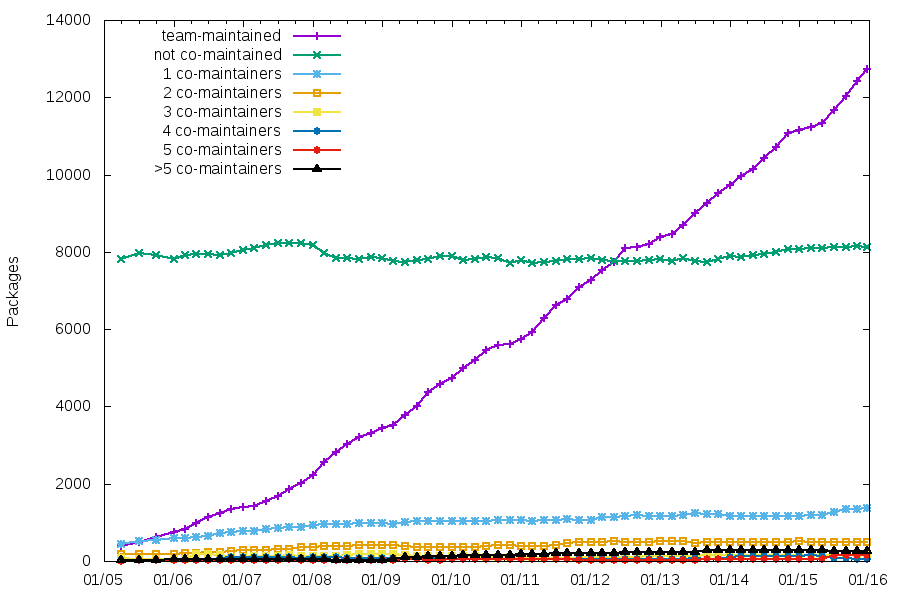
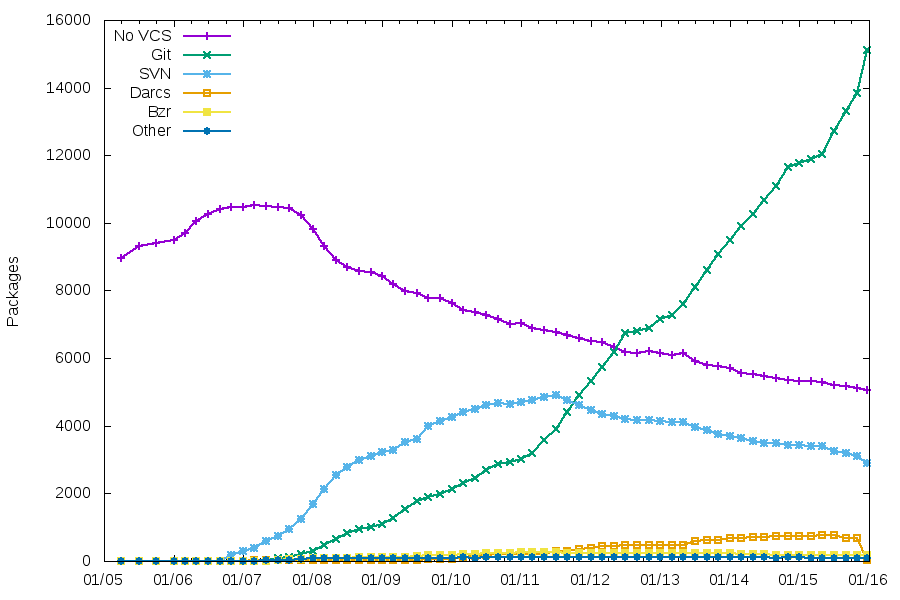 Git is the clear winner now, with the migration rate increasing recently.
Packaging helpers
Git is the clear winner now, with the migration rate increasing recently.
Packaging helpers
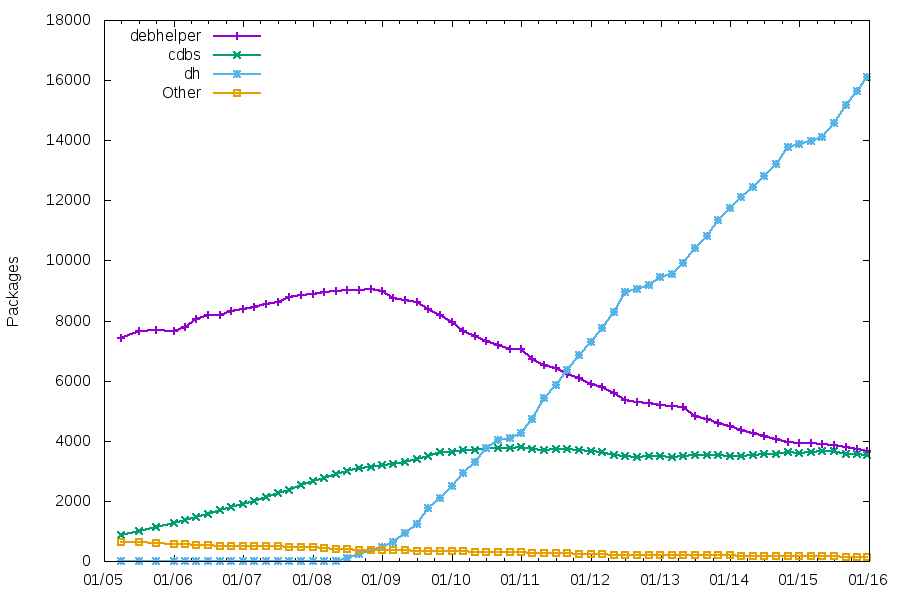 As usual, the number of packages using CDBS is quite stable. The number of packages using traditional debhelper might soon be lower than those using CDBS.
Patch systems and packaging formats
As usual, the number of packages using CDBS is quite stable. The number of packages using traditional debhelper might soon be lower than those using CDBS.
Patch systems and packaging formats
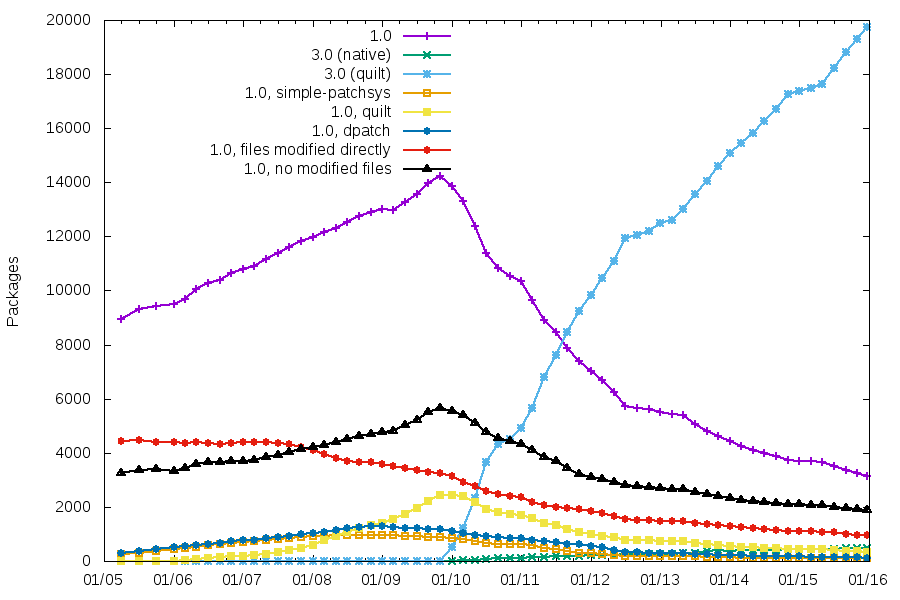

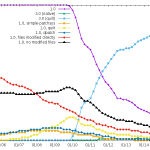
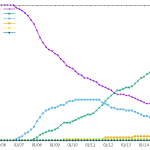
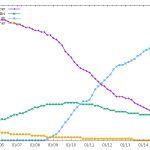
 logind hangs
If you just updated systemd and ssh to that host seems to hang, that's
just a known Bug (
logind hangs
If you just updated systemd and ssh to that host seems to hang, that's
just a known Bug ( What happened about the
What happened about the  Yesterday, my first term started as the
Yesterday, my first term started as the